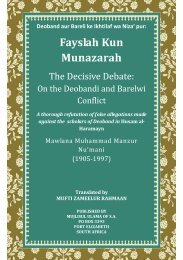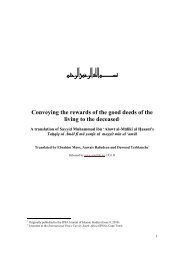al_etidaal_gn
al_etidaal_gn
al_etidaal_gn
Create successful ePaper yourself
Turn your PDF publications into a flip-book with our unique Google optimized e-Paper software.
They were more honoured and ex<strong>al</strong>ted beings than us.<br />
It is possible that it may be said that those were the Sahabah (Radi<strong>al</strong>lahu anhu). They<br />
were more honoured and ex<strong>al</strong>ted beings than us. How can we compare others to them?<br />
To them I answer. Yes, correct, but the speaker is Umar bin Abdul Aziz. He is an<br />
eminent Tabi’ee of high rank. And he is the one who refuses to indulge in attacking them.<br />
(If he has not the right, how can we have it?)<br />
The story of Nabi Musa Alayhis S<strong>al</strong>aam and Khidr Alayhis S<strong>al</strong>aam is mentioned in the<br />
Quran and is a very well-known story. Risulullah (S<strong>al</strong>l<strong>al</strong>lahu Alayhi Was<strong>al</strong>lam) is<br />
reported to have said: “May Allah have mercy on Moosa (Alayhis S<strong>al</strong>aam). If he had<br />
remained silent, he would have learnt so many more wonderful things from Khidr<br />
(Alayhis S<strong>al</strong>aam).”<br />
Rasulullah (S<strong>al</strong>l<strong>al</strong>lahu Alayhi Was<strong>al</strong>lam) is <strong>al</strong>so reported to have said: “Nabi Isa Alayhis<br />
S<strong>al</strong>aam said: ‘There are three types of cases. One is that where the guidance is clear cut,<br />
follow it. Second is that type of case where the f<strong>al</strong>sehood thereof is quite clear. Avoid it.<br />
The third case is that wherein there is doubt. Refer such a case to the experts in that<br />
field.”(Tabrani).<br />
Rasulullah (S<strong>al</strong>l<strong>al</strong>lahu Alayhi Was<strong>al</strong>lam) is <strong>al</strong>so reported to have said: “He who is very<br />
hasty and so bold as to pass verdicts is <strong>al</strong>so bold in taking the path towards hell.”<br />
(Daramie).<br />
Sayyidina Abdullah bin Masood (Radi<strong>al</strong>lahu anhu) said: “He who is prepared to give an<br />
answer to every fatwa asked of him is a mad person.” (Daramie).<br />
What Jbn Masood (Radi<strong>al</strong>lahu anhu) meant is that many questions are being asked<br />
regarding needless and meaningless things. And is often these days. The object behind<br />
the asking of fatwas is often not to gain knowledge or to know how to act accordingly,<br />
but rather to disgrace someone or to stir trouble against another. Hence in such fatwas<br />
one should take <strong>al</strong>l the precautions. Sometimes questions are framed in such ambiguous<br />
terms that to give answers in such cases can be quite bold or even foolish.<br />
Rasulullah (S<strong>al</strong>l<strong>al</strong>lahu Alayhi Was<strong>al</strong>lam) once said: “The permissible is quite clear and<br />
the prohibited is quite. clear, In between lies numerous doubtful things.” In such doubtful<br />
things one should take <strong>al</strong>l precaution.<br />
Rasulullah (S<strong>al</strong>l<strong>al</strong>lahu Alayhi Was<strong>al</strong>lam) <strong>al</strong>so said:<br />
“When affairs are placed in the hands of such people who are incompeten1t (of carrying<br />
out the responsibility), then await the Hour of Doom.” (Bukhari).<br />
Likewise is the case when incompetent ones begin to sit in judgeiflei’it on eimnent<br />
Ulema: Rasulullah (S<strong>al</strong>l<strong>al</strong>lahu Alayhi Was<strong>al</strong>lam) <strong>al</strong>so said: “It is <strong>al</strong>so a si<strong>gn</strong> of the<br />
coming of Qiyamat when knowledge is being sought from people of the lower ranks of<br />
the learned.”<br />
Al- Eti’da<strong>al</strong> Fi Maraatibur- Rija<strong>al</strong> 23




